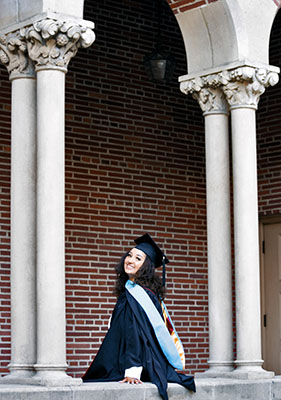As an undergraduate at the University of California, Santa Cruz, Rachel Freeman-Cohen (Stevenson, ‘20, Feminist Studies) loved advocating for students and championing inclusion on campus.
After being named Vice President of Diversity and Inclusion for the UC Santa Cruz Student Union Assembly in 2019, Freeman-Cohen left an ebullient introductory message on the SUA web page:
“I'm so extremely excited to spend a brand new year with you. I have SO MANY ideas that I'm hoping to implement.”
Now Freeman-Cohen, who uses she/they pronouns, has turned advocacy work into a rewarding career helping undergraduate and graduate college students thrive.
After graduating from UC Santa Cruz four years ago, Freeman-Cohen headed to the University of Southern California to pursue a Master’s of Education degree in Postsecondary Administration and Student Affairs.
At USC, Freeman-Cohen worked as a graduate assistant for the LGBTQ+ Student Center, which provides support, education, advocacy, and community for all undergraduate and graduate students with an emphasis on students across the spectrum of gender and sexuality. Freeman-Cohen graduated summa cum laude in 2022.
Until earlier this year, Freeman-Cohen worked as inaugural director of LGBTQIA+ Student Services at Whitman College in Walla Walla, Washington. This spring, they started working as Student Life Advisor at San Diego State University, developing and implementing programs that foster scholarship, personal and leadership development and campus engagement.
“I’m grateful for the opportunities I’m having now, and it all kind of started for me at UC Santa Cruz,” Freeman-Cohen said. “My junior year, in 2019, helped build a foundation when it comes to advocacy work.”
Learning to thrive under pressure
The UC Santa Cruz 2019-20 academic year was intense for Freeman-Cohen and their friends. They faced one challenge and interruption after the other.
The campus faced major impacts from Northern California wildfires. UC Santa Cruz also experienced a number of planned power outages by PG&E and a strike by graduate students followed by the advent of COVID-19, which made the university pivot to remote instruction.
"Having to navigate all those different issues at the same time and still figure out the best way to help other students really informed how I do my work, especially in the early days of COVID when we had no idea what it was and how to find the best way forward,” Freeman-Cohen recalled.
“On the one hand, COVID really put a wrench in my plans for senior year, but it was also a way to kind of let go of what I thought I should do after college and really focus on and work towards what I really wanted to do,” Freeman-Cohen continued.
Freeman-Cohen had to contend with some initial doubts about what to do after college.
“But I had a village of support to help me on my way,” they said.
One invaluable mentor was Shauntay Larkins, Director of Student Achievement and Lead Academic Advisor for the Humanities Division, who helped Freeman-Cohen realize that a career in advocacy work was possible.
Right from the start, Larkins recognized Freeman-Cohen’s strong potential.
“I’ve had the pleasure of knowing Rachel since they were a senior in high school,” Larkins said.
They met when Larkins was the Admissions Counselor of Diversity Initiatives at UC Santa Cruz. Larkins invited Freeman-Cohen to visit the campus as part of outreach efforts to admitted ABC (African-Black-Caribbean)-identified students.
Their paths crossed again a couple of years later when Larkins became the Assistant Manager/Undergraduate Advisor for the Critical Race & Ethnic Studies Department and Rachel began exploring the possibility of a Feminist Studies/CRES double major.
“I had the distinct privilege of watching Rachel move from a reticent admitted student, content to let their mom ask all the questions, to an active student leader, peer mentor, and eventual role model dedicated to helping incoming students not only transition to the university but also flourish and thrive while here,” Larkins continued.
Larkins is thrilled to see Freeman-Cohen’s career flourishing.
“Given their work as an undergraduate around campus climate issues, and attention to student-centered programming, intentional community building and overall student well-being, it’s not at all surprising to me to see Rachel turning into a dedicated professional student advocate.”
Freeman-Cohen is grateful to UC Santa Cruz for serving as a launching pad for a flourishing career.
“If it wasn’t for my mentors, if it wasn’t for a lot of my experiences at UC Santa Cruz, I would not be transitioning into a new field in higher education,” Freeman-Cohen said. “A really big part of me is nervous because I’ve started a brand-new job and am having a new adventure, but I am more comfortable doing this because of all my past experiences to fall back on. And I’m so excited for what the future is going to bring.”



